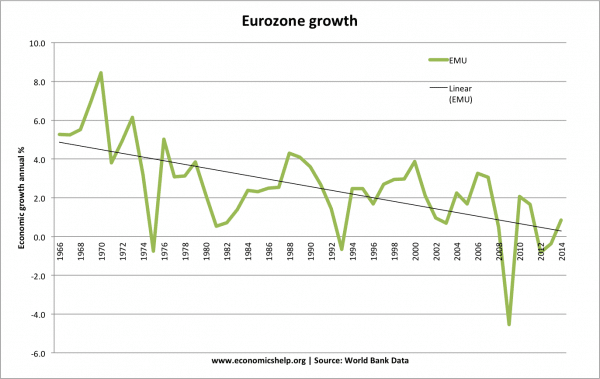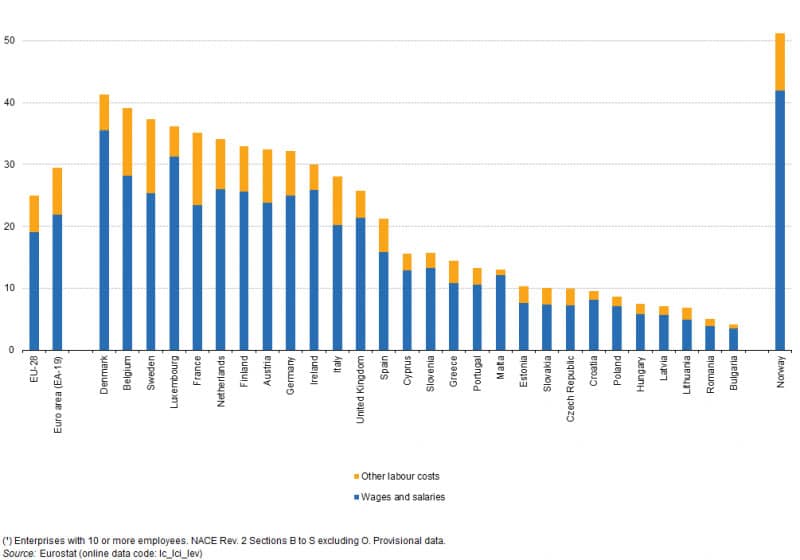The EU has many achievements of which it can rightly claim.
- Long period of peace and prosperity, unrivalled in European history.
- Secured transition to democracy for countries such as Spain and post-Communist countries in Eastern Europe
- Free trade and free movement has helped improve economic growth and living standards.
- Working on European wide problems, such as environment and over-stocking
However, despite these considerable achievements, the EU has become more unpopular amongst the electorate of member states, with many feeling the EU has lost its way and made several mistakes that have created divisions within Europe – rather than bringing the people of Europe together. One thing worth mentioning is that the mistakes of the EU are very much due to the mistakes of elected national politicians who have failed to reform the EU or have pushed the EU in a certain direction. Greater wisdom by elected politicians of member states could have moved the EU in a more successful direction.
Mistakes of the EU
- Single Currency / Euro is fundamentally flawed
Whatever the political hopes of a Single Currency, the economics have been devastating for several countries who have joined – in particular, Greece, Portugal, Ireland and Spain. Many economists believed that the Eurozone was not an optimal currency area and trying to runa common economic area (with common monetary policy, fixed exchange rate, but no common fiscal policy) would lead to tensions. However, the EU pushed through the project and appears unable to deal with the consequences of 20% + unemployment in southern Europe. In addition, the Euro is very difficult to leave. Yet despite problems of a Single Currency, the EU continue to make new members join Euro, even though Eastern European countries are even more diversified and different from core of the Eurozone. The basic structural weakness of the Euro have not been dealt with, but we are encouraging countries to join, who are likely at some stage in the future to experience similar crisis to recent events.
Eurozone growth past 50 years

Problems of Single Currency
- Southern economies with higher labour costs saw a decline in competitiveness, current account deficits of 10% + but couldn’t devalue to restore competitiveness. Therefore, the economies were forced into a painful period of deflationary pressures.
- Pressure for austerity. Countries in Eurozone saw rising bond yields, because of lack of lender of last resort. This caused EU to pressurise countries into austerity, which have created a dynamic of debt-deflation. Even with ECB stepping up to provide liquidity, it has not solved general tendency to austerity.
- Greece voted to end austerity, but effectively EU politicians forced it to back track and accept reform, austerity and because of the structure of the Eurozone, Greece was shown to have no ability to choose its path.
- See more on Problems of the Single Currency.
2. Failure to tackle unemployment
Unemployment is the biggest economic cause of social problems and decline in quality of life. However, EU unemployment has become much higher than US and other major economies. Unemployment is particularly a problem amongst young people. The cause of EU unemployment is related to the deflationary bias of the Eurozone, structural issues in labour market (e.g. lack of flexibility) but also the insistence on austerity.
To some extent, the blame for unemployment cannot be put all on the European Union. It is national politicians of member countries who have chosen austerity and a failure to reform labour markets is partly due to government policy (e.g. France unable to overcome opposition to Union resistance of labour market reform). The UK’s unemployment rate showed that outside the Eurozone it is much easier to have low unemployment. But, the EU does have to take some responsibility for pushing the Single Currency onto countries who were not suited to joining.
3. Free movement of labour between countries with widely different wage rates.
It should be remembered that the free movement of labour is a cornerstone of EU ideals. It was created with the noble idea to reduce nationalism and friction between different people. This free movement of labour worked relatively well until the expansion of the EU into the east. The problem is that with large disparities in average wages, this created a strong incentive for large scale economic migration. The quantity of net migrants into the UK has been a source of unhappiness amongst native born people – especially those working in low paid jobs.
There are definitely economic benefits behind the free movement of labour. But, that doesn’t mean it leads to a pareto improvement – with some losing out – or least perceiving they lose out. Some who feel squeezed by lower wages, housing queues, and NHS queues blame this net migration on reducing their quality of life. Yet, from their perspective, the EU prohibit any kind of restriction on inward migration. This is primary source of frustration with EU.
You could argue the media exaggerate costs of migration and you could point to net fiscal contributions of migrants, but the scale of inward migration has led to resentment that has been impossible to assuage.
The EU could have limited free movement of labour until there was evidence of much closer wage levels within Europe. Free movement of labour has been wildly unpopular in the UK and is overwhelmingly the reason for Brexit.
The problem is high unemployment, low growth and large scale immigration is always a recipe for some kind of social tension and could see the EU being increasingly blamed in other countries.
The EU could have taken a more pragmatic approach – we aim for free movement of labour as our ideal, but we have to see closer economic integration (and more similar wage rates) before it becomes a reality.
The sad thing is the ideal of free movement of labour was aiming to bring different European nationalities together. But, recent experience shows large inflows of people into a country suffering shortage of housing and general austerity measures has done the opposite and increased tensions. Some will say, people are wrong to resent migrants when it’s really austerity. But, if the EU is democratic it has to be willing to listen to everyone – not just those who benefit from globalisation.
The mistake of the EU was to have less flexibility insisting the principle must be applied whatever the outcome. You could argue a similarity with the Eurozone – one size fits all approach. The EU mindset has been “Integration is good, so it must work out OK.”
If nothing else, there should have been recognition of the problems of free movement of labour and the EU should have targeted more funds to those areas seeing influx of migrant workers.
Common Agricultural Policy
The CAP used to receive 70% of EU funds, it is now down to 40%, but is still by far the flagship policy of the EU. Unfortunately, it confirms the stereotype of EU policy being dictated by selfishness and leading to wasteful spending. The CAP involves the transfer of large sums of money to rich landowners. There is no social, economic or environmental justification behind this transfer from the average tax payer to wealthy landowners. In fact the Single Farm payment has encouraged the removal of trees and natural vegetation – even at high environmental cost. (Cost of CAP at Guardian)
If these funds were used for regional development and used to help reduce unemployment, then the EU would have more authority to claim it was spending money in a way which benefits all. But, because of vested interests, it has proved very hard to reform CAP and 40% of the EU’s spending money is wasted. (Transfer of funds)
Originally CAP was a delight to teach economic students because it was a perfect example of government failure – oversupply, food surpluses, dumping on world markets. These aspects have been reformed, but the transfer of money to wealthy landowners has not.
Conclusion
I supported UK membership of the EU – despite these mistakes. I feel the EU has potential to be a great force for good, and I wanted the UK to be a force for positive change in Europe. Now the UK has taken a different path, but I do hope the EU can learn from these mistakes to create an EU that works for all, and not just the vision of ‘elites’ in Brussels and self-interest of rich landowners. A failure of the European project would be very discouraging and likely lead to the rise of more xenophobia and resentment across Europe.
BTW: I support EU regulations like limiting power of vacuum cleaners and kettles, and also EU fisheries policy trying to deal with chronic over-fishing. This is exactly what the EU should be doing – creating a European wide approach to reducing global warming and shared problems.
It is a mistake of British people to say – we should be able to do what we want and ignore environmental impact of our choices.


